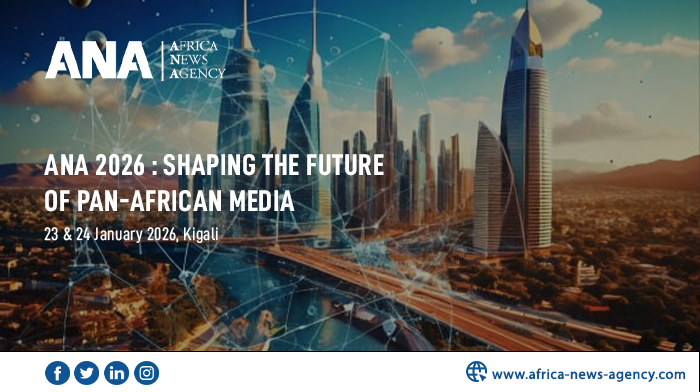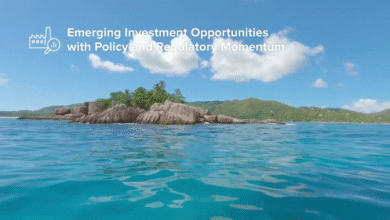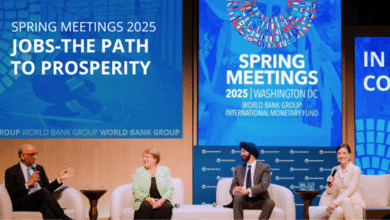African Economic Outlook 2020: “Developing Africa’s workforce for the future”
According to the African Economic Outlook 2020, the African Development Bank would announce a continuation of growth, despite external shocks; its president, Akinwumi Adesina, says there is still an urgent need to correct the training and employment mismatches in Africa in order to better understand the fourth industrial revolution.
By Bilkiss Mentari
« Africa’s economic growth remains stabilized at 3.4% in 2019 despite external shocks, and is on track and expected to pick up to 3.9% this year and 4.1% in 2021, » according to the main summary of the African Development Bank’s « African Economic Outlook 2020 » report released on 30 January.
The continental GDP growth ,which is lower than expected, is partly due to the moderate expansion of the continent’s « big five economies »; Algeria, Egypt, Morocco, Nigeria and South Africa, whose combined growth averaged 3.1%, compared to 4.0% for the rest of the continent.
« For the first time in a decade, capital expenditure accounted for more than half of the continent’s GDP growth”
That has been said, the report points out, in 2019, for the first time in a decade, investment spending, rather than consumption, accounted for more than half of the continent’s GDP growth. If confirmed, this development will contribute structurally to sustaining the economy and potentially accelerate Africa’s future growth, while increasing the continent’s present and future productive base and improving workforce productivity.
Overall, the forecasts show that the continent’s growth fundamentals have improved as the continent’s growth actors are gradually shifting away from individual consumption towards investment and net exports.
East Africa maintained its lead as the fastest growing region on the continent, with an estimated average growth of 5.0% in 2019; North Africa was the second fastest, at 4.1%, while growth in West Africa reached 3.7 % in 2019, up from 3.4% in the previous year.
Central Africa grew by 3.2% in 2019, down from 2.7% in 2018, while growth in Southern Africa slowed considerably over the same period, from 1.2% to 0.7%, owing that to the impact of the devastating cyclones Idai and Kenneth.
According to the institution, there is still an « urgent » need to correct the training and employment mismatch in Africa. Thus, while the theme of the 2020 Report is « Developing Africa’s workforce for the future », the Bank calls for urgent action to ensure human capital development in African countries where, in terms of quantity and quality, human capital is much lower than in other regions of the world.
The report also notes the urgent need for capacity building and for drafting several policy recommendations, including calling for more government investment in education and infrastructure to maximize the long-term benefits of GDP growth. Another key requirement, highlighted by the report, is the development of a workforce capable of meeting the demand which consists of meeting the needs of industry.
« Africa needs to develop skills in information and communication technologies as well as in science, technology, engineering and mathematics. The fourth industrial revolution will place increasing demands on education systems that produce graduates with these types of skills, » the report notes.
To maintain unemployment at its current level, Africa will need to create 12 million jobs a year, the experts who wrote the report anticipated: « Given the predicted disruptions in workforce markets due to rapidly changing technologies, it is urgent that countries address the major bottlenecks that hamper the creation of human capital. »
« Youth unemployment must be a top priority «
« Youth unemployment must be a top priority. With 12 million graduates entering the labour market every year and only 3 million of them getting jobs, the rate of youth unemployment is growing every year, said Akinwumi Adesina. Let’s look at real life beyond the statistics. Let’s hear their voices, and feel their aspirations.
While many countries have strong growth indicators, a relatively small number of countries are showing significant declines in extreme poverty and inequality, which remain higher than in other regions of the world.
For the most part, inclusive growth (faster average consumption growth for the poor and lower inequality between different segments of the population) has occurred in only 18 of the 48 African countries for which data are available.
« Africa is endowed with resources, but its future lies in the hands of its people «
This is the main conclusion of the report. « As we enter a new decade, the African Development Bank is looking to its citizens. Africa is endowed with resources, but its future lies in the hands of its people, » said Hanan Morsy, Director of the Bank’s Macroeconomic Policy, Forecasting and Research Department. Education is the main engine of equality. We can begin to reduce poverty only by developing our workforce, so that we are able to close wage gaps and adopt new technologies to create jobs in knowledge-based sectors. »
Click hereto access the full report.







